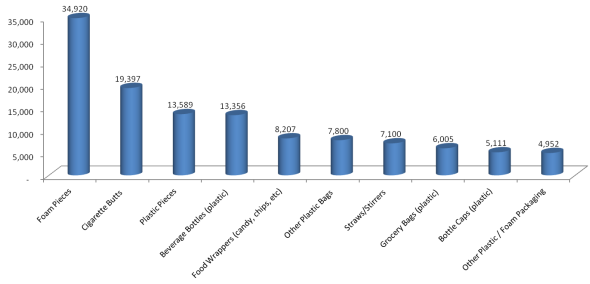When we visit the East Coast Park beach, the problem of marine trash always comes to mind as the shore is littered with trash, especially before the cleaners start clearing them. Marine trash is an issue that we think has got worse over the past decade, with no holistic solutions or action plans being implemented to solve the problem.
To address some of the concerns on marine trash found at beaches and mangroves in Singapore, let’s take a closer look at the amount of marine trash, the potential sources, key barriers, and our proposed action plan to tackle marine trash.
Marine Trash in Singapore
International Coastal Cleanup Singapore (ICCS) conducts annual beach and mangrove cleanups and publishes the data on marine trash in Singapore.
For the ICCS 2013 study alone, 3,473 volunteers covered 19,476 meters of coastline and collected 14,448 kg (153,147 pieces) of marine trash. Looking at the data, the average weight of marine trash collected by each volunteer has increased by 32% from 3.1 kg/person in 2002 to 4.2 kg/person in 2013. The average weight of marine trash collected for each meter of coastline has increased by 194% from 0.25 kg/m in 2002 to 0.74 kg/m in 2013.
The top 10 marine trash items collected in 2013 are shown in the following figure:
Potential Sources of Marine Trash in Singapore
Marine trash could come from the following sources:
- Illegal discharge of waste from ships
- Illegal disposal of waste into the sea from fish farms
- Illegal dumping of waste into the sea by companies
- Waste floating in from neighbouring countries
- Litter in the canals and drains leading to the sea
- Waste blown away from neighbourhoods, nearby roads or waste collection trucks to the coast
- Waste blown away from the litter bins at the beach to the coast due to overfilling or improper disposal by beachgoers
- Littering by beachgoers (local and foreigners) involved in activities such as cycling, jogging, swimming, relaxing, fishing, partying, barbecuing, or staying at chalets
- Waste blown away from premises at the beach or due to improper disposal by the premise, including chalets, bicycle shops, cafes and restaurants, food centres, and convenience stores
Key Barriers to Reducing Marine Trash in Singapore
We have identified 2 key barriers to marine trash reduction that needs to be resolved:
1) Lack of government coordinated efforts and enforcement
- Minimal efforts by the government agencies (NEA, NParks, AVA, MPA and PUB) in studying the sources, amount and type of marine trash (only ICCS is providing data)
- NEA is in-charge of clearing waste from public beaches, drains, waterways, and coastal parks, but there seems to be no government agency in-charge of working with the various agencies to set holistic policies to reduce marine trash
- Lack of proper waste disposal infrastructure for fish farms and enforcement regime
- Lack of enforcement on illegal waste discharge from ships
2) Insufficient education and people do not see the problem or impacts
- Efficient clearing of marine trash from beaches by cleaners means that the public do not see the problem
- Marine trash at mangroves are out of sight
- Public do not see the link between marine trash and the impacts on the environment and marine creatures
- Education efforts that target children are not really addressing the adults who litter or businesses that engage in illegal waste disposal
- Lack of public campaigns to focus on the problem of marine trash and how to reduce the waste
Proposed Action Plan to Reduce Marine Trash in Singapore
Based on the key barriers above, we recommend the following action plan for marine trash reduction in Singapore:
1) Appoint a dedicated government agency to lead in addressing marine trash
- Since NEA is already looking at littering, waste disposal and public cleanliness, we would recommend that NEA be the lead agency to study the problem of marine trash and work with the various agencies such as NParks, AVA, MPA and PUB to implement holistic policies to reduce marine trash
- The lead agency would study the sources, amount and type of marine trash and work with existing groups such as ICCS and Waterways Watch Society (WWS)
2) Increase enforcement and improve infrastructure
- Fish farms and ships anchored nearby should be informed and warned against illegal waste disposal and the penalties involved
- Proper waste collection and disposal facilities and procedures should be provided for the fish farms and ships
- Increase enforcement patrols at sea to ensure no illegal disposal from fish farms and ships
- Provide clear signage at beaches and barbeque pits to inform and educate beachgoers on proper waste disposal
- Improve or increase waste bins at beaches to minimise improper usage and overfilling
3) Introduce public campaign on reducing marine trash
- Start a marine trash campaign and communications to educate beachgoers (using social media, videos and onsite activities) on the problems and impacts of marine trash
- Appoint beach ambassadors to educate beachgoers and owners of premises at the beach
- Engage beachgoers to conduct impromptu beach cleanups
- Display marine trash as art exhibits at the beach
- Work with existing groups such as ICCS and WWS
4) Look at upstream policies to minimise plastic disposables and littering
- Address the use of plastic disposables such as polystyrene takeaway containers, plastic bottles, plastic bags, and plastic food packaging, which are common marine trash items
- Set policies to reduce the use of plastic disposables and encourage reusable containers, bottles and bags
- Continue with existing efforts to reduce littering on the streets
What do you think of the proposed action plan to tackle marine trash in Singapore? Do you find marine trash a serious problem at our beaches and coastal areas? Share your thoughts with us, thanks!
Image credit: ICCS 2013 – Top 10 Items, International Coastal Cleanup Singapore



2 thoughts on “Insights on Marine Trash in Singapore”